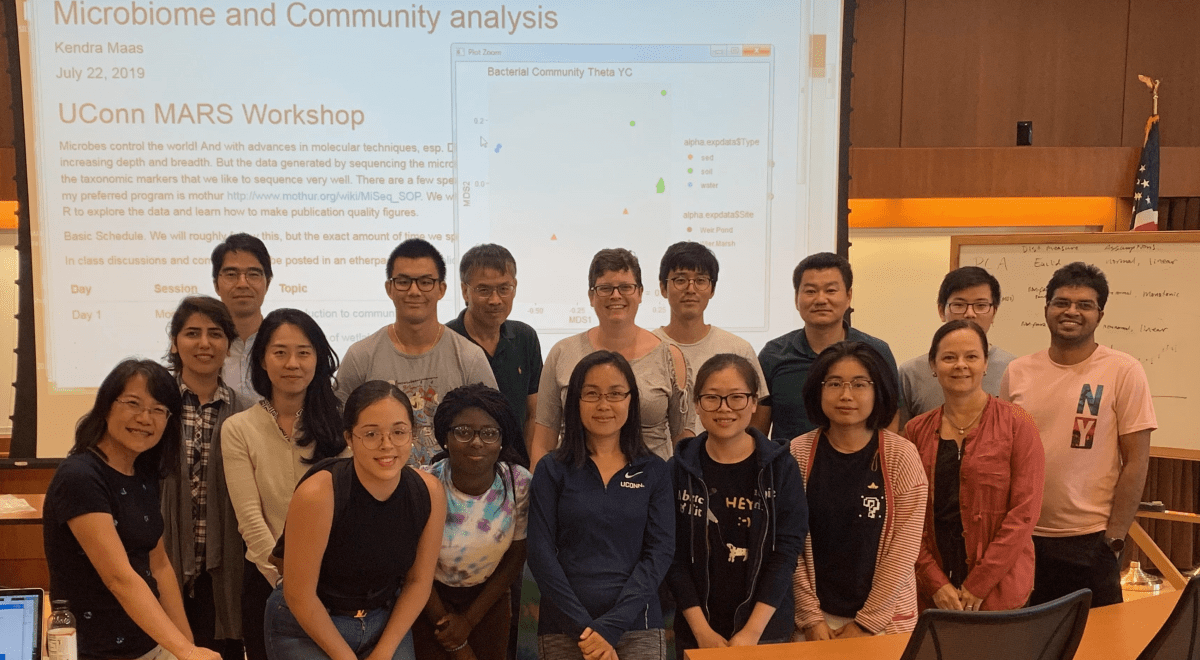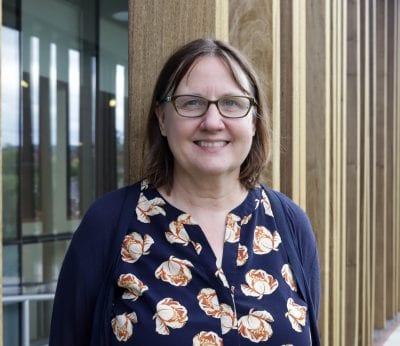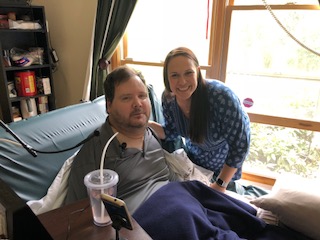 Congratulations to Zahra Amirkhanzadeh Barandouzi, our PhD student, and her committee members; Dr. Xiaomei Cong, Dr. Angela Starkweather and Dr. Wendy Henderson; on their grant award from American Nurses Foundation (ANF) for the proposal titled“Biomarkers of Emotional Distress in IBS Patients”.
Congratulations to Zahra Amirkhanzadeh Barandouzi, our PhD student, and her committee members; Dr. Xiaomei Cong, Dr. Angela Starkweather and Dr. Wendy Henderson; on their grant award from American Nurses Foundation (ANF) for the proposal titled“Biomarkers of Emotional Distress in IBS Patients”.
The purpose of this pilot study is to evaluate the role of the brain-gut microbiome axis in comorbidity between emotional distress and Irritable bowel syndrome (IBS).
The outcome of this study will shed light on the underlying pathophysiology of this comorbidity and translate the findings into innovative clinical strategies to improve treatment outcomes in IBS patients.
 Congratulations to Zahra Amirkhanzadeh Barandouzi, and Jie Chen, PhD students who have received the second set of CAMP-PRIM funds for their pilot research studies. Zahra has received a $2000 award for her project titled“Biomarkers of emotional distress and pain in IBS patients”. Jie has also received a $2000 award for his study titled “Phenotyping and Biomarkers of Pain in Older Adults with Heart Failure: A Pilot Study”.
Congratulations to Zahra Amirkhanzadeh Barandouzi, and Jie Chen, PhD students who have received the second set of CAMP-PRIM funds for their pilot research studies. Zahra has received a $2000 award for her project titled“Biomarkers of emotional distress and pain in IBS patients”. Jie has also received a $2000 award for his study titled “Phenotyping and Biomarkers of Pain in Older Adults with Heart Failure: A Pilot Study”.
 Congratulations to Dr. Ruth Lucas, and co-investigators Drs. Divya Ramesh and Heather Evans (University of Saint Joseph, Connecticut) on their $15,000 grant award from the American Nurses Foundation (ANF) for their proposal ANTENATAL CANNABIS USE: IMPLICATIONS FOR SYMPTOM MANAGEMENT AND RISK-TAKING. The purpose of this exploratory study is to describe cannabis use in pregnancy with a focus on pregnancy-related symptoms, social and emotional risk factors, and risk-taking behaviors. The proposed study will assess the feasibility of the nursing team to collect data in pregnant women who are cannabis users. The outcome of this study will identify modifiable factors of pregnancy related symptoms, social or emotional support or risk-taking behaviors, thus allowing for early intervention in this population.
Congratulations to Dr. Ruth Lucas, and co-investigators Drs. Divya Ramesh and Heather Evans (University of Saint Joseph, Connecticut) on their $15,000 grant award from the American Nurses Foundation (ANF) for their proposal ANTENATAL CANNABIS USE: IMPLICATIONS FOR SYMPTOM MANAGEMENT AND RISK-TAKING. The purpose of this exploratory study is to describe cannabis use in pregnancy with a focus on pregnancy-related symptoms, social and emotional risk factors, and risk-taking behaviors. The proposed study will assess the feasibility of the nursing team to collect data in pregnant women who are cannabis users. The outcome of this study will identify modifiable factors of pregnancy related symptoms, social or emotional support or risk-taking behaviors, thus allowing for early intervention in this population. Congratulations to Dr. Angela Starkweather, Professor and Associate Dean for Academic Affairs, and Director of the P20 Center for Accelerating Precision Pain Self-Management who has received a subaward of $68,149 from the University of Maryland at Baltimore (UMB) for a newly funded NINR study Physiological, psychological, and genomic factors that predict the transition from acute to chronic pain in patients with traumatic lower extremity fracture. Dr. Starkweather will work with Drs. Renn and Dorsey of UMB and Dr. Griffioen of University of Delaware to examine physiological, psychological, clinical, and sociodemographic factors predictive of chronic pain phenotype following lower extremity fracture. In addition, they will test the hypothesis that differences in gene expression will be associated with the chronic pain phenotype following lower extremity fracture. Their analyses will examine how changes in gene expression differ between extreme phenotypes at baseline and 52 weeks, and construct a database of altered gene expression profiles as well as novel therapeutic targets and pathways for better pain management.
Congratulations to Dr. Angela Starkweather, Professor and Associate Dean for Academic Affairs, and Director of the P20 Center for Accelerating Precision Pain Self-Management who has received a subaward of $68,149 from the University of Maryland at Baltimore (UMB) for a newly funded NINR study Physiological, psychological, and genomic factors that predict the transition from acute to chronic pain in patients with traumatic lower extremity fracture. Dr. Starkweather will work with Drs. Renn and Dorsey of UMB and Dr. Griffioen of University of Delaware to examine physiological, psychological, clinical, and sociodemographic factors predictive of chronic pain phenotype following lower extremity fracture. In addition, they will test the hypothesis that differences in gene expression will be associated with the chronic pain phenotype following lower extremity fracture. Their analyses will examine how changes in gene expression differ between extreme phenotypes at baseline and 52 weeks, and construct a database of altered gene expression profiles as well as novel therapeutic targets and pathways for better pain management. Congratulations to Rebecca Acabchuk, PhD and Sharon Casavant MSN, RN who have received the first set of CAMP-PRIM funds for their pilot research studies. Dr. Acabchuk has received a $1500 award for her project “Informing Mindfulness Studies for Pain and Addiction Recovery: Investigating the Inflammatory Pathway”. She will be working with her advisor Dr. Blair Johnson (Psychology) to examine salivary C-Reactive Protein levels pre- and post-mindfulness intervention among a sample of college students. Sharon Casavant has received $1000 grant for her study “Predicting Neurodevelopmental Outcomes of Preterm Infants Using Multi-Omic Measures (PRENOP): A Pilot Study of Gene Expression”. She will be working with her advisor Dr. Xiaomei Cong (Nursing) to examine changes in gene expression at 2 time points and investigate associations between gene expression and neurodevelopmental outcomes as a result of painful procedures in preterm infants.
Congratulations to Rebecca Acabchuk, PhD and Sharon Casavant MSN, RN who have received the first set of CAMP-PRIM funds for their pilot research studies. Dr. Acabchuk has received a $1500 award for her project “Informing Mindfulness Studies for Pain and Addiction Recovery: Investigating the Inflammatory Pathway”. She will be working with her advisor Dr. Blair Johnson (Psychology) to examine salivary C-Reactive Protein levels pre- and post-mindfulness intervention among a sample of college students. Sharon Casavant has received $1000 grant for her study “Predicting Neurodevelopmental Outcomes of Preterm Infants Using Multi-Omic Measures (PRENOP): A Pilot Study of Gene Expression”. She will be working with her advisor Dr. Xiaomei Cong (Nursing) to examine changes in gene expression at 2 time points and investigate associations between gene expression and neurodevelopmental outcomes as a result of painful procedures in preterm infants.
 cord injury experience chronic pain with at least one third having severely intense pain that impacts mood, function and quality of life. As part of her translational research program, Dr. Young uses rodent models to study the c
cord injury experience chronic pain with at least one third having severely intense pain that impacts mood, function and quality of life. As part of her translational research program, Dr. Young uses rodent models to study the c